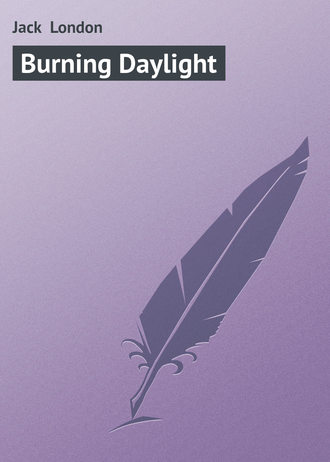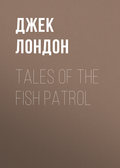
Джек Лондон
Burning Daylight
CHAPTER IX
Instead of returning to the city on Monday, Daylight rented the butcher's horse for another day and crossed the bed of the valley to its eastern hills to look at the mine. It was dryer and rockier here than where he had been the day before, and the ascending slopes supported mainly chaparral, scrubby and dense and impossible to penetrate on horseback. But in the canyons water was plentiful and also a luxuriant forest growth. The mine was an abandoned affair, but he enjoyed the half-hour's scramble around. He had had experience in quartz-mining before he went to Alaska, and he enjoyed the recrudescence of his old wisdom in such matters. The story was simple to him: good prospects that warranted the starting of the tunnel into the sidehill; the three months' work and the getting short of money; the lay-off while the men went away and got jobs; then the return and a new stretch of work, with the "pay" ever luring and ever receding into the mountain, until, after years of hope, the men had given up and vanished. Most likely they were dead by now, Daylight thought, as he turned in the saddle and looked back across the canyon at the ancient dump and dark mouth of the tunnel.
As on the previous day, just for the joy of it, he followed cattle-trails at haphazard and worked his way up toward the summits. Coming out on a wagon road that led upward, he followed it for several miles, emerging in a small, mountain-encircled valley, where half a dozen poor ranchers farmed the wine-grapes on the steep slopes. Beyond, the road pitched upward. Dense chaparral covered the exposed hillsides but in the creases of the canons huge spruce trees grew, and wild oats and flowers.
Half an hour later, sheltering under the summits themselves, he came out on a clearing. Here and there, in irregular patches where the steep and the soil favored, wine grapes were growing. Daylight could see that it had been a stiff struggle, and that wild nature showed fresh signs of winning-chaparral that had invaded the clearings; patches and parts of patches of vineyard, unpruned, grassgrown, and abandoned; and everywhere old stake-and-rider fences vainly striving to remain intact. Here, at a small farm-house surrounded by large outbuildings, the road ended. Beyond, the chaparral blocked the way.
He came upon an old woman forking manure in the barnyard, and reined in by the fence.
"Hello, mother," was his greeting; "ain't you got any men-folk around to do that for you?"
She leaned on her pitchfork, hitched her skirt in at the waist, and regarded him cheerfully. He saw that her toil-worn, weather-exposed hands were like a man's, callused, large-knuckled, and gnarled, and that her stockingless feet were thrust into heavy man's brogans.
"Nary a man," she answered. "And where be you from, and all the way up here? Won't you stop and hitch and have a glass of wine?"
Striding clumsily but efficiently, like a laboring-man, she led him into the largest building, where Daylight saw a hand-press and all the paraphernalia on a small scale for the making of wine. It was too far and too bad a road to haul the grapes to the valley wineries, she explained, and so they were compelled to do it themselves. "They," he learned, were she and her daughter, the latter a widow of forty-odd. It had been easier before the grandson died and before he went away to fight savages in the Philippines. He had died out there in battle.
Daylight drank a full tumbler of excellent Riesling, talked a few minutes, and accounted for a second tumbler. Yes, they just managed not to starve. Her husband and she had taken up this government land in '57 and cleared it and farmed it ever since, until he died, when she had carried it on. It actually didn't pay for the toil, but what were they to do? There was the wine trust, and wine was down. That Riesling? She delivered it to the railroad down in the valley for twenty-two cents a gallon. And it was a long haul. It took a day for the round trip. Her daughter was gone now with a load.
Daylight knew that in the hotels, Riesling, not quite so good even, was charged for at from a dollar and a half to two dollars a quart. And she got twenty-two cents a gallon. That was the game. She was one of the stupid lowly, she and her people before her-the ones that did the work, drove their oxen across the Plains, cleared and broke the virgin land, toiled all days and all hours, paid their taxes, and sent their sons and grandsons out to fight and die for the flag that gave them such ample protection that they were able to sell their wine for twenty-two cents. The same wine was served to him at the St. Francis for two dollars a quart, or eight dollars a short gallon. That was it.
Between her and her hand-press on the mountain clearing and him ordering his wine in the hotel was a difference of seven dollars and seventy-eight cents. A clique of sleek men in the city got between her and him to just about that amount. And, besides them, there was a horde of others that took their whack. They called it railroading, high finance, banking, wholesaling, real estate, and such things, but the point was that they got it, while she got what was left,-twenty-two cents. Oh, well, a sucker was born every minute, he sighed to himself, and nobody was to blame; it was all a game, and only a few could win, but it was damned hard on the suckers.
"How old are you, mother?" he asked.
"Seventy-nine come next January."
"Worked pretty hard, I suppose?"
"Sense I was seven. I was bound out in Michigan state until I was woman-grown. Then I married, and I reckon the work got harder and harder."
"When are you going to take a rest?"
She looked at him, as though she chose to think his question facetious, and did not reply.
"Do you believe in God?"
She nodded her head.
"Then you get it all back," he assured her; but in his heart he was wondering about God, that allowed so many suckers to be born and that did not break up the gambling game by which they were robbed from the cradle to the grave.
"How much of that Riesling you got?"
She ran her eyes over the casks and calculated. "Just short of eight hundred gallons."
He wondered what he could do with all of it, and speculated as to whom he could give it away.
"What would you do if you got a dollar a gallon for it?" he asked.
"Drop dead, I suppose."
"No; speaking seriously."
"Get me some false teeth, shingle the house, and buy a new wagon. The road's mighty hard on wagons."
"And after that?"
"Buy me a coffin."
"Well, they're yours, mother, coffin and all."
She looked her incredulity.
"No; I mean it. And there's fifty to bind the bargain. Never mind the receipt. It's the rich ones that need watching, their memories being so infernal short, you know. Here's my address. You've got to deliver it to the railroad. And now, show me the way out of here. I want to get up to the top."
On through the chaparral he went, following faint cattle trails and working slowly upward till he came out on the divide and gazed down into Napa Valley and back across to Sonoma Mountain… "A sweet land," he muttered, "an almighty sweet land."
Circling around to the right and dropping down along the cattle-trails, he quested for another way back to Sonoma Valley; but the cattle-trails seemed to fade out, and the chaparral to grow thicker with a deliberate viciousness and even when he won through in places, the canon and small feeders were too precipitous for his horse, and turned him back. But there was no irritation about it. He enjoyed it all, for he was back at his old game of bucking nature. Late in the afternoon he broke through, and followed a well-defined trail down a dry canon. Here he got a fresh thrill. He had heard the baying of the hound some minutes before, and suddenly, across the bare face of the hill above him, he saw a large buck in flight. And not far behind came the deer-hound, a magnificent animal. Daylight sat tense in his saddle and watched until they disappeared, his breath just a trifle shorter, as if he, too, were in the chase, his nostrils distended, and in his bones the old hunting ache and memories of the days before he came to live in cities.
The dry canon gave place to one with a slender ribbon of running water. The trail ran into a wood-road, and the wood-road emerged across a small flat upon a slightly travelled county road. There were no farms in this immediate section, and no houses. The soil was meagre, the bed-rock either close to the surface or constituting the surface itself. Manzanita and scrub-oak, however, flourished and walled the road on either side with a jungle growth. And out a runway through this growth a man suddenly scuttled in a way that reminded Daylight of a rabbit.
He was a little man, in patched overalls; bareheaded, with a cotton shirt open at the throat and down the chest. The sun was ruddy-brown in his face, and by it his sandy hair was bleached on the ends to peroxide blond. He signed to Daylight to halt, and held up a letter. "If you're going to town, I'd be obliged if you mail this."
"I sure will." Daylight put it into his coat pocket.
"Do you live hereabouts, stranger?"
But the little man did not answer. He was gazing at Daylight in a surprised and steadfast fashion.
"I know you," the little man announced. "You're Elam Harnish-Burning Daylight, the papers call you. Am I right?"
Daylight nodded.
"But what under the sun are you doing here in the chaparral?"
Daylight grinned as he answered, "Drumming up trade for a free rural delivery route."
"Well, I'm glad I wrote that letter this afternoon," the little man went on, "or else I'd have missed seeing you. I've seen your photo in the papers many a time, and I've a good memory for faces. I recognized you at once. My name's Ferguson."
"Do you live hereabouts?" Daylight repeated his query.
"Oh, yes. I've got a little shack back here in the bush a hundred yards, and a pretty spring, and a few fruit trees and berry bushes. Come in and take a look. And that spring is a dandy. You never tasted water like it. Come in and try it."
Walking and leading his horse, Daylight followed the quick-stepping eager little man through the green tunnel and emerged abruptly upon the clearing, if clearing it might be called, where wild nature and man's earth-scratching were inextricably blended. It was a tiny nook in the hills, protected by the steep walls of a canon mouth. Here were several large oaks, evidencing a richer soil. The erosion of ages from the hillside had slowly formed this deposit of fat earth. Under the oaks, almost buried in them, stood a rough, unpainted cabin, the wide verandah of which, with chairs and hammocks, advertised an out-of doors bedchamber. Daylight's keen eyes took in every thing. The clearing was irregular, following the patches of the best soil, and every fruit tree and berry bush, and even each vegetable plant, had the water personally conducted to it. The tiny irrigation channels were every where, and along some of them the water was running.
Ferguson looked eagerly into his visitor's face for signs of approbation.
"What do you think of it, eh?"
"Hand-reared and manicured, every blessed tree," Daylight laughed, but the joy and satisfaction that shone in his eyes contented the little man.
"Why, d'ye know, I know every one of those trees as if they were sons of mine. I planted them, nursed them, fed them, and brought them up. Come on and peep at the spring."
"It's sure a hummer," was Daylight's verdict, after due inspection and sampling, as they turned back for the house.
The interior was a surprise. The cooking being done in the small, lean-to kitchen, the whole cabin formed a large living room. A great table in the middle was comfortably littered with books and magazines. All the available wall space, from floor to ceiling, was occupied by filled bookshelves. It seemed to Daylight that he had never seen so many books assembled in one place. Skins of wildcat, 'coon, and deer lay about on the pine-board floor.
"Shot them myself, and tanned them, too," Ferguson proudly asserted.
The crowning feature of the room was a huge fireplace of rough stones and boulders.
"Built it myself," Ferguson proclaimed, "and, by God, she drew! Never a wisp of smoke anywhere save in the pointed channel, and that during the big southeasters."
Daylight found himself charmed and made curious by the little man. Why was he hiding away here in the chaparral, he and his books? He was nobody's fool, anybody could see that. Then why? The whole affair had a tinge of adventure, and Daylight accepted an invitation to supper, half prepared to find his host a raw-fruit-and-nut-eater or some similar sort of health faddest. At table, while eating rice and jack-rabbit curry (the latter shot by Ferguson), they talked it over, and Daylight found the little man had no food "views." He ate whatever he liked, and all he wanted, avoiding only such combinations that experience had taught him disagreed with his digestion.
Next, Daylight surmised that he might be touched with religion; but, quest about as he would, in a conversation covering the most divergent topics, he could find no hint of queerness or unusualness. So it was, when between them they had washed and wiped the dishes and put them away, and had settled down to a comfortable smoke, that Daylight put his question.
"Look here, Ferguson. Ever since we got together, I've been casting about to find out what's wrong with you, to locate a screw loose somewhere, but I'll be danged if I've succeeded. What are you doing here, anyway? What made you come here? What were you doing for a living before you came here? Go ahead and elucidate yourself."
Ferguson frankly showed his pleasure at the questions.
"First of all," he began, "the doctors wound up by losing all hope for me. Gave me a few months at best, and that, after a course in sanatoriums and a trip to Europe and another to Hawaii. They tried electricity, and forced feeding, and fasting. I was a graduate of about everything in the curriculum. They kept me poor with their bills while I went from bad to worse. The trouble with me was two fold: first, I was a born weakling; and next, I was living unnaturally-too much work, and responsibility, and strain. I was managing editor of the Times-Tribune-"
Daylight gasped mentally, for the Times-Tribune was the biggest and most influential paper in San Francisco, and always had been so.
"-and I wasn't strong enough for the strain. Of course my body went back on me, and my mind, too, for that matter. It had to be bolstered up with whiskey, which wasn't good for it any more than was the living in clubs and hotels good for my stomach and the rest of me. That was what ailed me; I was living all wrong."
He shrugged his shoulders and drew at his pipe.
"When the doctors gave me up, I wound up my affairs and gave the doctors up. That was fifteen years ago. I'd been hunting through here when I was a boy, on vacations from college, and when I was all down and out it seemed a yearning came to me to go back to the country. So I quit, quit everything, absolutely, and came to live in the Valley of the Moon-that's the Indian name, you know, for Sonoma Valley. I lived in the lean-to the first year; then I built the cabin and sent for my books. I never knew what happiness was before, nor health. Look at me now and dare to tell me that I look forty-seven."
"I wouldn't give a day over forty," Daylight confessed.
"Yet the day I came here I looked nearer sixty, and that was fifteen years ago."
They talked along, and Daylight looked at the world from new angles. Here was a man, neither bitter nor cynical, who laughed at the city-dwellers and called them lunatics; a man who did not care for money, and in whom the lust for power had long since died. As for the friendship of the city-dwellers, his host spoke in no uncertain terms.
"What did they do, all the chaps I knew, the chaps in the clubs with whom I'd been cheek by jowl for heaven knows how long? I was not beholden to them for anything, and when I slipped out there was not one of them to drop me a line and say, 'How are you, old man? Anything I can do for you?' For several weeks it was: 'What's become of Ferguson?' After that I became a reminiscence and a memory. Yet every last one of them knew I had nothing but my salary and that I'd always lived a lap ahead of it."
"But what do you do now?" was Daylight's query. "You must need cash to buy clothes and magazines?"
"A week's work or a month's work, now and again, ploughing in the winter, or picking grapes in the fall, and there's always odd jobs with the farmers through the summer. I don't need much, so I don't have to work much. Most of my time I spend fooling around the place. I could do hack work for the magazines and newspapers; but I prefer the ploughing and the grape picking. Just look at me and you can see why. I'm hard as rocks. And I like the work. But I tell you a chap's got to break in to it. It's a great thing when he's learned to pick grapes a whole long day and come home at the end of it with that tired happy feeling, instead of being in a state of physical collapse. That fireplace-those big stones-I was soft, then, a little, anemic, alcoholic degenerate, with the spunk of a rabbit and about one per cent as much stamina, and some of those big stones nearly broke my back and my heart. But I persevered, and used my body in the way Nature intended it should be used-not bending over a desk and swilling whiskey… and, well, here I am, a better man for it, and there's the fireplace, fine and dandy, eh?
"And now tell me about the Klondike, and how you turned San Francisco upside down with that last raid of yours. You're a bonny fighter, you know, and you touch my imagination, though my cooler reason tells me that you are a lunatic like the rest. The lust for power! It's a dreadful affliction. Why didn't you stay in your Klondike? Or why don't you clear out and live a natural life, for instance, like mine? You see, I can ask questions, too. Now you talk and let me listen for a while."
It was not until ten o'clock that Daylight parted from Ferguson. As he rode along through the starlight, the idea came to him of buying the ranch on the other side of the valley. There was no thought in his mind of ever intending to live on it. His game was in San Francisco. But he liked the ranch, and as soon as he got back to the office he would open up negotiations with Hillard. Besides, the ranch included the clay-pit, and it would give him the whip-hand over Holdsworthy if he ever tried to cut up any didoes.
CHAPTER X
The time passed, and Daylight played on at the game. But the game had entered upon a new phase. The lust for power in the mere gambling and winning was metamorphosing into the lust for power in order to revenge. There were many men in San Francisco against whom he had registered black marks, and now and again, with one of his lightning strokes, he erased such a mark. He asked no quarter; he gave no quarter. Men feared and hated him, and no one loved him, except Larry Hegan, his lawyer, who would have laid down his life for him. But he was the only man with whom Daylight was really intimate, though he was on terms of friendliest camaraderie with the rough and unprincipled following of the bosses who ruled the Riverside Club.
On the other hand, San Francisco's attitude toward Daylight had undergone a change. While he, with his slashing buccaneer methods, was a distinct menace to the more orthodox financial gamblers, he was nevertheless so grave a menace that they were glad enough to leave him alone. He had already taught them the excellence of letting a sleeping dog lie. Many of the men, who knew that they were in danger of his big bear-paw when it reached out for the honey vats, even made efforts to placate him, to get on the friendly side of him. The Alta-Pacific approached him confidentially with an offer of reinstatement, which he promptly declined. He was after a number of men in that club, and, whenever opportunity offered, he reached out for them and mangled them. Even the newspapers, with one or two blackmailing exceptions, ceased abusing him and became respectful. In short, he was looked upon as a bald-faced grizzly from the Arctic wilds to whom it was considered expedient to give the trail. At the time he raided the steamship companies, they had yapped at him and worried him, the whole pack of them, only to have him whirl around and whip them in the fiercest pitched battle San Francisco had ever known. Not easily forgotten was the Pacific Slope Seaman's strike and the giving over of the municipal government to the labor bosses and grafters. The destruction of Charles Klinkner and the California and Altamont Trust Company had been a warning. But it was an isolated case; they had been confident in strength in numbers-until he taught them better.
Daylight still engaged in daring speculations, as, for instance, at the impending outbreak of the Japanese-Russian War, when, in the face of the experience and power of the shipping gamblers, he reached out and clutched practically a monopoly of available steamer-charters. There was scarcely a battered tramp on the Seven Seas that was not his on time charter. As usual, his position was, "You've got to come and see me"; which they did, and, to use another of his phrases, they "paid through the nose" for the privilege. And all his venturing and fighting had now but one motive. Some day, as he confided to Hegan, when he'd made a sufficient stake, he was going back to New York and knock the spots out of Messrs. Dowsett, Letton, and Guggenhammer. He'd show them what an all-around general buzz-saw he was and what a mistake they'd made ever to monkey with him. But he never lost his head, and he knew that he was not yet strong enough to go into death-grapples with those three early enemies. In the meantime the black marks against them remained for a future easement day.
Dede Mason was still in the office. He had made no more overtures, discussed no more books and no more grammar. He had no active interest in her, and she was to him a pleasant memory of what had never happened, a joy, which, by his essential nature, he was barred from ever knowing. Yet, while his interest had gone to sleep and his energy was consumed in the endless battles he waged, he knew every trick of the light on her hair, every quick denote mannerism of movement, every line of her figure as expounded by her tailor-made gowns. Several times, six months or so apart, he had increased her salary, until now she was receiving ninety dollars a month. Beyond this he dared not go, though he had got around it by making the work easier. This he had accomplished after her return from a vacation, by retaining her substitute as an assistant. Also, he had changed his office suite, so that now the two girls had a room by themselves.
His eye had become quite critical wherever Dede Mason was concerned. He had long since noted her pride of carriage. It was unobtrusive, yet it was there. He decided, from the way she carried it, that she deemed her body a thing to be proud of, to be cared for as a beautiful and valued possession. In this, and in the way she carried her clothes, he compared her with her assistant, with the stenographers he encountered in other offices, with the women he saw on the sidewalks. "She's sure well put up," he communed with himself; "and she sure knows how to dress and carry it off without being stuck on herself and without laying it on thick."
The more he saw of her, and the more he thought he knew of her, the more unapproachable did she seem to him. But since he had no intention of approaching her, this was anything but an unsatisfactory fact. He was glad he had her in his office, and hoped she'd stay, and that was about all.
Daylight did not improve with the passing years. The life was not good for him. He was growing stout and soft, and there was unwonted flabbiness in his muscles. The more he drank cocktails, the more he was compelled to drink in order to get the desired result, the inhibitions that eased him down from the concert pitch of his operations. And with this went wine, too, at meals, and the long drinks after dinner of Scotch and soda at the Riverside. Then, too, his body suffered from lack of exercise; and, from lack of decent human associations, his moral fibres were weakening. Never a man to hide anything, some of his escapades became public, such as speeding, and of joy-rides in his big red motor-car down to San Jose with companions distinctly sporty-incidents that were narrated as good fun and comically in the newspapers.
Nor was there anything to save him. Religion had passed him by. "A long time dead" was his epitome of that phase of speculation. He was not interested in humanity. According to his rough-hewn sociology, it was all a gamble. God was a whimsical, abstract, mad thing called Luck. As to how one happened to be born-whether a sucker or a robber-was a gamble to begin with; Luck dealt out the cards, and the little babies picked up the hands allotted them. Protest was vain. Those were their cards and they had to play them, willy-nilly, hunchbacked or straight backed, crippled or clean-limbed, addle-pated or clear-headed. There was no fairness in it. The cards most picked up put them into the sucker class; the cards of a few enabled them to become robbers. The playing of the cards was life-the crowd of players, society.
The table was the earth, and the earth, in lumps and chunks, from loaves of bread to big red motor-cars, was the stake. And in the end, lucky and unlucky, they were all a long time dead.
It was hard on the stupid lowly, for they were coppered to lose from the start; but the more he saw of the others, the apparent winners, the less it seemed to him that they had anything to brag about. They, too, were a long time dead, and their living did not amount to much. It was a wild animal fight; the strong trampled the weak, and the strong, he had already discovered,-men like Dowsett, and Letton, and Guggenhammer,-were not necessarily the best. He remembered his miner comrades of the Arctic. They were the stupid lowly, they did the hard work and were robbed of the fruit of their toil just as was the old woman making wine in the Sonoma hills; and yet they had finer qualities of truth, and loyalty, and square-dealing than did the men who robbed them. The winners seemed to be the crooked ones, the unfaithful ones, the wicked ones. And even they had no say in the matter. They played the cards that were given them; and Luck, the monstrous, mad-god thing, the owner of the whole shebang, looked on and grinned. It was he who stacked the universal card-deck of existence.
There was no justice in the deal. The little men that came, the little pulpy babies, were not even asked if they wanted to try a flutter at the game. They had no choice. Luck jerked them into life, slammed them up against the jostling table, and told them: "Now play, damn you, play!" And they did their best, poor little devils. The play of some led to steam yachts and mansions; of others, to the asylum or the pauper's ward. Some played the one same card, over and over, and made wine all their days in the chaparral, hoping, at the end, to pull down a set of false teeth and a coffin. Others quit the game early, having drawn cards that called for violent death, or famine in the Barrens, or loathsome and lingering disease. The hands of some called for kingship and irresponsible and numerated power; other hands called for ambition, for wealth in untold sums, for disgrace and shame, or for women and wine.
As for himself, he had drawn a lucky hand, though he could not see all the cards. Somebody or something might get him yet. The mad god, Luck, might be tricking him along to some such end. An unfortunate set of circumstances, and in a month's time the robber gang might be war-dancing around his financial carcass. This very day a street-car might run him down, or a sign fall from a building and smash in his skull. Or there was disease, ever rampant, one of Luck's grimmest whims. Who could say? To-morrow, or some other day, a ptomaine bug, or some other of a thousand bugs, might jump out upon him and drag him down. There was Doctor Bascom, Lee Bascom who had stood beside him a week ago and talked and argued, a picture of magnificent youth, and strength, and health. And in three days he was dead-pneumonia, rheumatism of the heart, and heaven knew what else-at the end screaming in agony that could be heard a block away. That had been terrible. It was a fresh, raw stroke in Daylight's consciousness. And when would his own turn come? Who could say?
In the meantime there was nothing to do but play the cards he could see in his hand, and they were BATTLE, REVENGE, AND COCKTAILS. And Luck sat over all and grinned.







